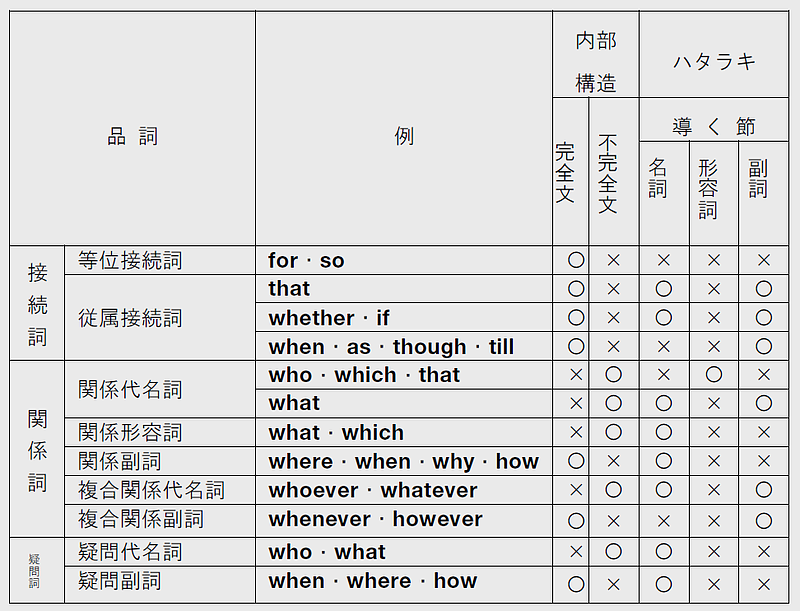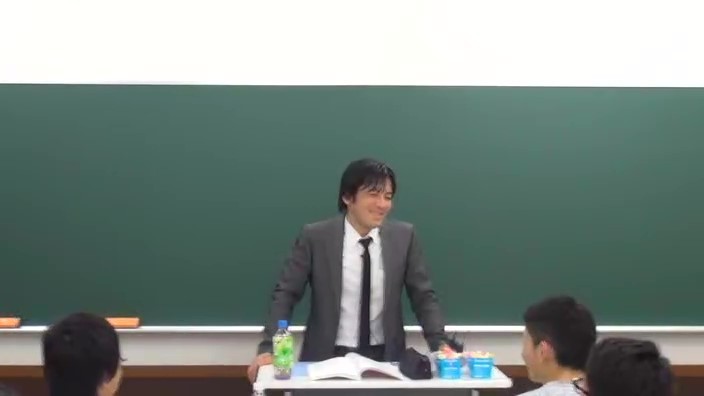英文法5分ドリル【代名詞】⑤
本記事は独学・国内学習による
英検1級保持者が書きました。
✰✰『節』の考え方 ✰✰
❶ 《名詞節》
節全体が S, O, C, 前置詞の目的語のいずれか
I think that he is a liar .
(彼は嘘つきだと思う)
❷《形容詞節》
節全体が左の名詞を修飾する
〈関係詞節〉のことだと考えてよい
The man who came late is Mr. Yamada .
(遅れてきた人は山田です)
❸ 《副詞節》
名詞節・形容詞節以外の全ての従属節
I read novels before I go to bed .
(私は寝る前に小説を読みます)
( ) the weather was bad, we went on a picnic.
① In spite of
② Despite
③ Although
④ Even
① 前置詞:後ろに名詞を1個取る
② 前置詞:後ろに名詞を1個取る
③ 接続詞:文(SV)と文を接続する
④ 副詞 :文構造に影響を与えない
S V 構造が2つあるので空所に入るのは接続詞③。
④はEven thoughであれば可。
英語では1文中に S V が二つあると必ず
接続詞か関係詞が1つ必要。
(両者共〈疑問詞〉扱いの場合もある)
このような接続機能を持つ語は節の先頭に立って
意味のカタマリをまとめる。
また文中で名詞か形容詞か副詞のハタラキをする。
これらの節を〈名詞節〉〈形容詞節〉〈副詞節〉
とそれぞれ呼ぶが,まとめて「従属節」とも言う。
一方,関係詞も接続詞もついていない SV を「主節」と言い,
情報の中心を表す。機械で例えると,
✰〔主 節〕 = 本体(英文に1つ存在する)
✰〔従属節〕 = 部品(いくつか存在しえる)
従属節によるSVの連結は,理論上無限に続けることができる。
例文で見て見よう。
After she left, he arrived so that he might meet her.
S’ V’ S V S’ V’
SV構造が3つだから連結機能を持つ接続詞が2つ。
主節は he arrived で他の節は従属節。
一般に,
[ SVの合計-接続詞/関係詞の数=1 ]
の公式が成立。
通例[省略]の考え方もこの数式を前提としている。
正解:③
「天気は悪かったが,我々はピクニックに行った」
Although the weather was bad, we went on a picnic.
Despite the bad weather, we went on a picnic.
Even though the weather was bad, we went on a picnic.
Notwithstanding the bad weather, we went on a picnic.
In my class there are 20 students, most of ( ) are from the far East.
① that
② who
③ whose
④ whom
先行詞は20 studentsで「人」
①~④はすべて人を先行詞にできるので,
関係詞節内でのハタラキが解答根拠になる。
空所の前に of があることから,
入るべき関係詞は〈目的格〉と決まる。
② whoは〈主格〉。
③ whose は〈所有格〉で共に失格。
whom は前置詞の目的語として機能が可能でなので④が正解。
関係詞 that は
who, whom, which や when, why, how の代用が可能。
しかし前置詞やカンマの後に置けない。
よって,①は不可。
☆☆ 関係詞 that にできないこと ☆☆
❒ 前置詞の後に置けない
❒ カンマ(,)の後に置けない
正解:④
「僕のクラスに20人の学生がいて,その大部分は極東出身だ」
In my class there are 20 students, most of whom are from the far East.
Among the 20 students in my class, the majority are from the far East.
Out of the 20 students in my class, the majority are from the far East.
In my class of 20 students, most hail from the far East.
( ) your effort whether you’ll succeed or not.
① You need
② It depends on
③ That makes
④ But for
<whether A (or not) >
⒜〔名詞節〕「…かどうか」
⒝〔副詞節〕「…であろうとなかろうと」〈譲歩〉
if にも同様の意味があるが,
whetherと異なり文頭には置けない。
言い換えると,
Whether you will succeed or not depends on your effort.
『…かどうかは〈人に〉重要ではない』
It makes no difference〈to me〉whether he comes or not.
=It is all the same〈to me〉whether he comes or not.
=It is no matter〈to me〉whether he comes or not.
〈参考〉
疑問詞が導く節は一般に名詞節だが,
この表現では副詞節のように感じられ,
結果willを用いず,現在形を用いることが多い。
matter の後の whether[if] 節は
副詞節と考えて現在形で表す。
ここから先は文法分類をこだわるべき領域ではない。
正解:②
「成功するかどうかは君の努力しだいだ」
It depends on your effort whether you’ll succeed or not.
Your success hinges on the effort you put in.
Whether you succeed or not is contingent on your effort.
Success or failure is determined by the effort you exert.
This is just ( ) I’ve been looking for.
① that
② which
③ what
④ because
S V 構造が二つ。
空所の後は前置詞 for の目的語が無く,不完全な文。
完全な文を後に従える④because を消去。
② which 及び① that を関係代名詞と考えても,
前に先行詞となるべく名詞が無いので共に失格。
is の補語となるべく名詞節を形成する what が正しい。
what 〈関係詞代名詞〉:
★ 先行詞を内在する
★ the thing(s) which に相当する表現
★ 不完全な文を従えて〈名詞節〉まとめる
This is (just)[what I’ve been looking for ●]
S V C
正解:③
「これは私がちょうど探していたものです」
This is just what I’ve been looking for.
This is exactly what I’ve been searching for.
This is precisely what I’ve been seeking.
This is precisely what I’ve been in search of.
The mountain ( ) is covered with snow is called Mt. Fuji.
① whose mountain
② of which summit
③ which of the summit
④ whose summit
関係詞の節の範囲を決定したい。
<S+関係詞節>では2個目の動詞の前で斬るので,
[関係詞節]= ( ) is covered with snow
選択肢①~④の関係詞に先行詞を代入して機能させ,
文が成立するか検討して見よう。
① whose(=the mountain) mountain
「山の山」となって意味が通らない
② summit of which(=the mountain)
でsummitにtheが必要
③ which(=the mountain) of the summit
「頂上の山」となり意味が通らない
④ whose(=the mountain’s) summit
「山の頂上」で意味が通るので正解
2文解体して問題文の構文成立過程を確認してみよう。
The mountain is called Mt. Fuji.
Its summit is covered with snow.
代名詞 its を関係代名詞 whose に変えて
the mountain の直後に置く。
The mountain whose summit is covered with snow is called Mt. Fuji.
また,この文は次の2文合成という考え方もある。
The mountain is called Mt. Fuji.
The summit of it is covered with snow.
代名詞 it を関係代名詞 whichに変えて,
the summit ofとセットで先行詞の直後に置くと,
The mountain the summit of which is covered with snow is called Mt. Fuji.
文語体ではあるが,
the summit と of which の位置は置き換え可。
The mountain of which the summit is covered with snow is called Mt. Fuji.
この構造は結局,
本問選択肢②の summit に the がついたものと同じである。
正解:④
「頂上が雪で覆われている山は富士山と呼ばれています」
The mountain whose summit is covered with snow is called Mt. Fuji.
Mt. Fuji, whose summit is covered with snow, is the mountain.
Mt. Fuji is the mountain that has a snow-covered summit.
The snow-covered summit characterizes Mt. Fuji.
( ) rich you are, you still can’t afford to live in a castle.
① Although
② Nevertheless
③ However
④ How
S V 構造が2個あるので、
空所に関係詞か接続詞が必要。
② Neverthelessは副詞だから失格。
カンマ(,)の右側は完全な文なので,
( ) rich you are 全体で〈副詞節〉になるはず。
〈規則〉完全な文の左側は副詞節/副詞句/副詞である
④ How は常に名詞節を導くので不可。
① althoughは〈副詞節〉を導く。
ここでは空所の後が,
rich(C) you(S) are(V)
と〈倒置〉になっていることから不可。
正解は③However。
however は常に副詞節を導く。
how(ever) は本来副詞で,
veryと同様に修飾する形容詞や副詞と分離は不可。
その直後に引きずり込む。
これは〈牽引〉と呼ばれる現象。
元来の文を想起できるようにしておく必要がある。
you are rich ▸ however rich you are
S V C C S V
正解:③
「君がどんなに金持ちでも,城に住むほど裕福ではないだろう」
However rich you are, you still can’t afford to live in a castle.
No matter how wealthy you are, you cannot afford to live in a castle.
Regardless of your wealth, living in a castle is still unattainable.
Even if you are incredibly rich, residing in a castle remains out of reach.
( ) there is a difficulty in the plan is quite understandable to me.
① What
② Whatever
③ That
④ Therefore
V が2つあって2つ目のVであるisが左にとる主語は,
( ) に入る関係詞か接続詞に導かれ,
全体で名詞節主語として機能することになる。
( ) there is a difficulty in the plan (S)
is (V)
quite understandable to me (C)
④Thereforeは副詞で消去。
① what ② whatever は名詞節を導くが,
後に来るのは不完全な文なので,両者不可。
③That は名詞節を導くことができて,
その場合後には完全な文が来るのでこれが正解。
正解:③
「その計画が難しいということは私にはよくわかる」
That there is a difficulty in the plan is quite understandable to me.
It is quite understandable to me that there is a difficulty in the plan.
I understand perfectly well that there is a difficulty in the plan.
The presence of a difficulty in the plan is clear to me.
The house ( ) roof you see over there is my father’s.
① which
② whose
③ that
④ who
The house is my father’s.
You see its roof over there.
関係詞に変える規則は次のとおり。
★ its〈所有格〉▸ whose,
★ of it ▸ of which
of that は存在しない形。
③ that は前置詞の目的語としては不可。
書き換えると,
The house the roof of which you can see over there is my father’s.
正解:②
「あそこに屋根の見える家が私の父の家です」
The house whose roof you see over there is my father’s.
The house with the visible roof over there belongs to my father.
My father owns the house with the roof you see from here.
That house, whose roof is visible, is my father’s.
The book ( ) was too difficult for the students.
① chose the teacher
② the teacher chose
③ the teacher chose it
④ which chose the teacher
空所を除いて
The book(S) was(V) difficult(C)
で文構造が成立。
選択肢が全て動詞を含んでいる。
よって ( ) には名詞節以外の節が入る。
まず④は
The book(=which) chose the teacher
「本が先生を選んだ」
だから不可。
残りの選択肢は全て関係詞も接続詞も付いていない。
ここで目的格関係詞省略の可能性を想起出来るだろうか。
つまり,the bookが目的語として機能できる選択肢を選ぶ。
① chose the teacher は主語が欠落。
③ the teacher chose it は文が成立しており the bookが入る余地がない。
② the teacher chose は目的語が欠落しており,
the teacher chose the book
(先生は本を選んだ)
と意味も構造も問題なく,全体で,
The book[(which) the teacher chose](S)
was (V)
too difficult for the students. (C)
となり,②が正解。
正解:②
「先生が選んだ本は学生たちには難しすぎた」
The book the teacher chose was too difficult for the students.
The book selected by the teacher was overly challenging for the students.
The book the teacher picked proved too difficult for the students.
The students found the book chosen by the teacher too hard.
Japan is now very different from ( ) she was twenty years ago.
① the condition
② what
③ which
④ whom
S V 構造が二つだから,空所に接続詞か関係詞が必要。
<what S is >「今のSの状態」
国は普通,文化的には she,地理的にはitで受ける。
①は on condition that という接続詞があるが,
このままでは文を繋ぐことができないので消去。
空所の後の was に続く補語が無いので不完全な文。
空所の前に先行詞となるべく名詞が無い。
よって③④は共に失格。
正解:②
「今の日本は20年前とはかなり違う」
Japan is now very different from what she was twenty years ago.
Japan has undergone significant changes compared to twenty years ago.
Japan today is markedly different from its state two decades ago.
The Japan of today contrasts greatly with its condition twenty years ago.
It began to rain and, ( ) was worse, I lost my way in the dark.
① how
② that
③ what
④ which
<what is worse (better) >
「さらに悪い(よい)ことには」
=to make matters worse
=worse still
<what is+比較級>
「さらに~なことには」
は副詞節として働く。
以下類例。
He is honest, and, what is still better, very polite.
(彼は正直だ。更によい事にはとても礼儀正しい)
The book is useful, and, what is more, it is not expensive.
(その本は有益で,その上,安価である)
正解:③
「雨が降り始めた,更に悪いことに暗闇で道に迷った」
It began to rain and, what was worse, I lost my way in the dark.
Not only did it start to rain, but I also lost my way in the dark, which was worse.
To make matters worse, along with the rain, I lost my way in the dark.
What compounded the situation was the rain, and on top of that, I lost my way in the dark.
Kate must be sick, ( ) she looks pale.
① and
② nor
③ that
④ for
S V 構造が2つあるので空所に接続詞か関係詞が必要。
前述の〈判断〉について〈理由〉を述べる
〈接続詞〉forを用いる。
この場合 for の直前にはカンマ(,)を打つのが普通。
〈人〉 look pale. 「〈人〉の顔色が悪い」
この意味の for は,because, as と異なり,
主文の後にしか使えない。
実際の英文では文頭に置いている場合も見かけるが,
英作文ではNGと考える。
正解:④
「ケイトは病気に違いない,顔色が悪いから」
Kate must be sick, for she looks pale.
Kate appears pale, indicating that she might be unwell.
Kate's pallor suggests she might be sick.
The fact that Kate looks pale suggests she is possibly sick.
音読基本英文
Although the weather was bad, we went on a picnic.
Despite the bad weather, we went on a picnic.
Even though the weather was bad, we went on a picnic.
Notwithstanding the bad weather, we went on a picnic.
「僕のクラスに20人の学生がいて,その大部分は極東出身だ」
In my class there are 20 students, most of whom are from the far East.
Among the 20 students in my class, the majority are from the far East.
Out of the 20 students in my class, the majority are from the far East.
In my class of 20 students, most hail from the far East.
「成功するかどうかは君の努力しだいだ」
It depends on your effort whether you’ll succeed or not.
Your success hinges on the effort you put in.
Whether you succeed or not is contingent on your effort.
Success or failure is determined by the effort you exert.
「これは私がちょうど探していたものです」
This is just what I’ve been looking for.
This is exactly what I’ve been searching for.
This is precisely what I’ve been seeking.
This is precisely what I’ve been in search of.
「頂上が雪で覆われている山は富士山と呼ばれています」
The mountain whose summit is covered with snow is called Mt. Fuji.
Mt. Fuji, whose summit is covered with snow, is the mountain.
Mt. Fuji is the mountain that has a snow-covered summit.
The snow-covered summit characterizes Mt. Fuji.
「君がどんなに金持ちでも,城に住むほど裕福ではないだろう」
However rich you are, you still can’t afford to live in a castle.
No matter how wealthy you are, you cannot afford to live in a castle.
Regardless of your wealth, living in a castle is still unattainable.
Even if you are incredibly rich, residing in a castle remains out of reach.
「その計画が難しいということは私にはよくわかる」
That there is a difficulty in the plan is quite understandable to me.
It is quite understandable to me that there is a difficulty in the plan.
I understand perfectly well that there is a difficulty in the plan.
The presence of a difficulty in the plan is clear to me.
「あそこに屋根の見える家が私の父の家です」
The house whose roof you see over there is my father’s.
The house with the visible roof over there belongs to my father.
My father owns the house with the roof you see from here.
That house, whose roof is visible, is my father’s.
「先生が選んだ本は学生たちには難しすぎた」
The book the teacher chose was too difficult for the students.
The book selected by the teacher was overly challenging for the students.
The book the teacher picked proved too difficult for the students.
The students found the book chosen by the teacher too hard.
「今の日本は20年前とはかなり違う」
Japan is now very different from what she was twenty years ago.
Japan has undergone significant changes compared to twenty years ago.
Japan today is markedly different from its state two decades ago.
The Japan of today contrasts greatly with its condition twenty years ago.
「雨が降り始めた,さらに悪いことには私は暗闇で道に迷った」
It began to rain and, what was worse, I lost my way in the dark.
Not only did it start to rain, but I also lost my way in the dark, which was worse.
To make matters worse, along with the rain, I lost my way in the dark.
What compounded the situation was the rain, and on top of that, I lost my way in the dark.
「ケイトは病気に違いない,顔色が悪いから」
Kate must be sick, for she looks pale.
Kate appears pale, indicating that she might be unwell.
Kate's pallor suggests she might be sick.
The fact that Kate looks pale suggests she is possibly sick.
要点整理ノート【関係詞】
Ⅰ. 2文合成
☆ 主格
I know an American .
He speaks Japanese well.
➪ I know an American who speaks Japanese well.
★人称・数は先行詞に一致する
(a) She has a son who lives in Tokyo.
(b) She has two sons who live in Tokyo.
☆ 目的格
The steak was good.
I ate it yesterday.
➪ The steak which I ate yesterday was good.
★目的格の関係代名詞は省略可
=The steak I ate yesterday was good.
Ⅱ. whose
⑴ He was reading a book . I didn't know its title.
➪ He was reading a book whose title I didn't know.
彼は,私が題名を知らない本を読んでいた
⑵ He was reading a book . I didn't know the title of the book .
➪ He was reading a book the title of which I didn't know.
彼は,私が題名を知らない本を読んでい
Ⅲ. 関係代名詞 & 関係副詞
関係代名詞と関係副詞の使い分け:
次の空所はwhich かwhere か?
★ This is the place ( ) I lived.
これが私の住んでいた場所です。
*空所にwhich は不可。
I lived the place.とは言えない。
live が自動詞。
正解はwhere か in which。
★ This is the place ( ) I visited.
これが私の訪ねた場所です。
*関係副詞where は不可。
visit は他動詞で I visited the place. と言える。
よってwhich が正解。
以上から言えることは,
関係代名詞と関係副詞は後ろの文構造が異なる。
❑ 関係代名詞 ➪ 不完全文
❑ 関係副詞 ➪ 完全文
Ⅳ. < 前置詞+関係代名詞 >
〈前置詞+関係代名詞〉は前提となるセットフレーズがある。
1. 右側の動詞部分に注目し,熟語を見抜く
☞ be successful in
Poor planning may result in choosing a job in which you will not be truly successful.
(1) Poor planning may result in choosing a job.
(2) You will not be truly successful in the job.
計画がひどいと,まともに成功しない職を選ぶことになる。
2. 左側の先行詞に注目し,熟語を見抜く
☞ under the conditions
The conditions under which these works were created were usually of a most difficult kind.
(1) The conditions were usually of a most difficult kind.
(2) These works were created under the conditions. * under the condition = under them
この素晴らしい作品が作られた状況は通常,非常に困難な種のものであった
3. 右側の動詞と左側の先行詞の両方を見て見抜く
☞ talk with
She is the girl with whom I talked yesterday.
(彼女は私が昨日話をした女の子です)
(1) She is the girl.
(2) I talked with her yesterday.
◆ 一般に関係副詞=前置詞+関係代名詞と言える
☆ where =in[at, on] which
☆ when =in[at, on] which
☆ why =for which
☆ how =in which
China is a country which I want to visit.
=China is a country where I want to live.
=China is a country (which) I want to live in.
=China is a country in which I want to live.
Ⅴ. 継続用法
(1) I said nothing, which made him still more angry.
➪ I said nothing, and it made him still more angry.
私は何も言わなかったが,そのため彼は一層腹を立てた。
(2) I respect his father, who is a great scholar.
➪ I respect his father, for he is a great scholar.
私は彼のお父さんを尊敬しています。というのも,彼は偉大な学者だからです。
(3) Alice, who is the brightest girl in the class, solved it.
➪ Alice, because she is the brightest girl in the class, solved it.
アリスはクラスで一番頭のいい少女なので,それを解いた。
(4) He spoke English and French, neither of which I could understand.
➪ He spoke English and French, but I could understand neither of them.
彼は英語とフランス語を話したが,私はそのどちらも理解できなかった。
(5) I went into the restaurant, where I happened to meet her.
➪ I went into the restaurant, and there I happened to meet her.
私はそのレストランに入って,そこで偶然彼女に会った。
Ⅵ. 〔関係形容詞〕
❑ what〈関係形容詞〉「少ないながらもすべての〜」
He gave me what little money he had.
彼は私に少ないながらもすべてのお金をくれた。
❑ which〈関係形容詞〉「その〜」
The letter was written in French, which language I do not understand.
=The letter was written in French, and I do not understand the language.
その手紙はフランス語で書かれていたが,その言葉は私にはわからない。
Ⅶ. I think (believe/suppose)
I saw a woman who (I thought) was a friend of my mothers.
(⺟の友人だと思われる婦人を見かけました)
<who/which+SV+V’X> 構造を
『連鎖関係詞』
と言う。
SV を〈挿入〉と考えて
文構造から取り除いて考えると分かり易い。
以下類例。
Do what (you think)is right.
自分が正しいと思うことをしなさい。
Which is the girl whom (you said)he was going out with ?
彼がつき合っていると君が言った女の子はどの子ですか。
Ⅷ. 文または文の一部を先行詞とする関係詞
(1) Her father returned home from abroad, which made her very glad.
彼女の父は外国から帰ってきたが,そのことで彼は大変喜んだ。
(2) She said she had no money, which was a lie.
彼女は金がないといったが,それはうそだった。
(3) I advised him to give up drinking, which he never did.
私は彼に酒をやめるように忠告したが,彼は決してそうしなかった。
(4) As is often the case with Nancy, she was late for school again.
ナンシーにはよくあることだが,彼女はまた学校に遅刻した。
★関係詞が分離する場合
(1) Jane is the only one of her family that has no love for rock music.
ジェーンは家族の中でロックが好きではないただ1 人の人間だ。
(2) He knows that way of speaking which attracts everyone.
彼は皆を引きつける話し方を心得ている。
Ⅸ. 関係代名詞 than
He does not have the money. + The money is needed.
(a) He does not have the money which is needed.
彼は必要なお金を持っていない。
(b) He does not have more money than is needed.
彼は必要以上のお金を持っていない。
(1) He has more money than he had last year.
彼は去年以上にお金を持っている
(2) I have more money than I can spend.
私は使いきれないくらいのお金を持っている。
Ⅹ. 複合関係詞 whoever・whomever
◆ 〔名詞節〕
❑ whoever/whomever…
「〜する人はだれでも」
(1) You may invite to the party whoever likes to come .
来たい人なら誰でもパーティーに招待していいよ。
(2) He spoke to whomever he met.
彼は会う人なら誰でも話しかけた。
◆ 〔副詞節〕
❑ whoever (=no matter who) …「誰が〜しても」
❑ whomever (=no matter whom) …「誰に(を)〜しても」
Whoever comes, I won't let him in.
たとえ誰が来ようとも,中には入れないよ。
Whomever she invites , she is very kind to him.
たとえ誰を招待しても,彼女はとても親切だ。
Ⅺ. 連鎖関係詞
whenever・wherever
〔副詞節〕「〜するときはいつでも」・「〜する所はどこでも」
❑ whenever ~ (=no matter when ~) 「いつ〜しても」
❑ wherever ~ (=no matter where ~) 「どこに〜しても」
(1) He'll give you advice whenever you ask for it.
あなたが求めればいつでも彼はあなたに助言を与えてくれますよ
(2) Sit wherever you like.
好きな所ならどこでもすわりなさい。
whichever
〔名詞節〕 「〜するものはどちらでも」
(1) Take whichever you like.
あなたの好きなものをどちらでも取りなさい。
(2) You may use whichever dictionary there is on the desk.
机の上にあるのならどちらの辞書でも使ってもいいよ。
〔副詞節〕 「どちらが(を)〜しても」= no matter which ~
(1) Whichever wins, I'll be happy.
どちらが勝っても,私はうれしい
(2) Whichever side wins, I'll be happy.
どちらの側が勝っても,私はうれしい。
whatever
〔名詞節〕「〜するものは何でも」「どんな〜でも」
(1) I will do whatever I can do for you.
私はあなたのためにできることなら何でもしてあげよう。
(2) Please sing whatever song you know.
あなたの知っているのならどんな歌でも歌ってください。
〔副詞節〕
「何が(を)〜しても」
「どんな…が〜しても」(=no matter what ~)
(1) Whatever you ( may ) say, I don't believe you.
君が何を言っても,私は信じない。
(2) Whatever language you study, you cannot master it in a short time.
どんな言語を学ぶにしても,短時間では習得できない。
no ~ whatever「少しの~もない」<否定の強調>
I know nothing whatever about it.
私はそれについて全く何も知らない
however
〔副詞節〕
「どんなに〜でも」
「どんな方法で〜しても」(=no matter how)
(1) The novel, however interesting ( it is ), is not good for children.
どんなにおもしろくても,その小説は子供にはよくない。
(2) However we ( may ) go, we must get there by seven.
どんな方法で行くにしても,7 時までにそこに着かねばならない。
(3) However often you ( may ) try that way, you will not succeed.
その方法では何度やっても,成功しないだろう。
cf.) 論理接続の副詞「しかしながら」
Air travel is fast; sea travel is, however, restful.
空の旅は速い,しかし,船旅は落ち着く。
◆ 複合関係詞 まとめ
⑴ 複合関係代名詞 ➪ 名詞節
whoever(whomever), whichever, whatever
Whatever has a beginning has an end.
始まりがあるものは何でも終わりがある。
The club admits whoever pays the entry fee.
そのクラブは入会料金を払う者なら誰でも受け入れます。
Don’t tell it to whomever you don’t trust.
信頼していない人には誰であろうとそれを伝えないで。
Choose whichever you think better.
君が良いと思うほうのどちらでも選んでよいです。
⑵ 複合関係代名詞・複合関係副詞 ➪ 副詞節
whoever(whomever), whichever, whatever
whenever, wherever, however
Whoever may come, tell him I’m out.
=No matter who may come, tell him I’m out.
誰が来ようとも,私は不在であると伝えてください。
Whatever may happen, I will never change my mind.
= No matter what may happen, I will never change my mind.
何が起ころうとも,私は決して考えを変えません。
Whenever you may visit him, you will find him studying.
= No matter when you may visit him, you will find him studying.
いつ訪問しても,彼は勉強しているよ。
However hard he may try, he will not succeed.
= No matter how hard he may try, he will not succeed.
どんなにがんばっても,彼は成功しないだろう。
今後も英語学習に関わる情報、体験談を発信していきます。









